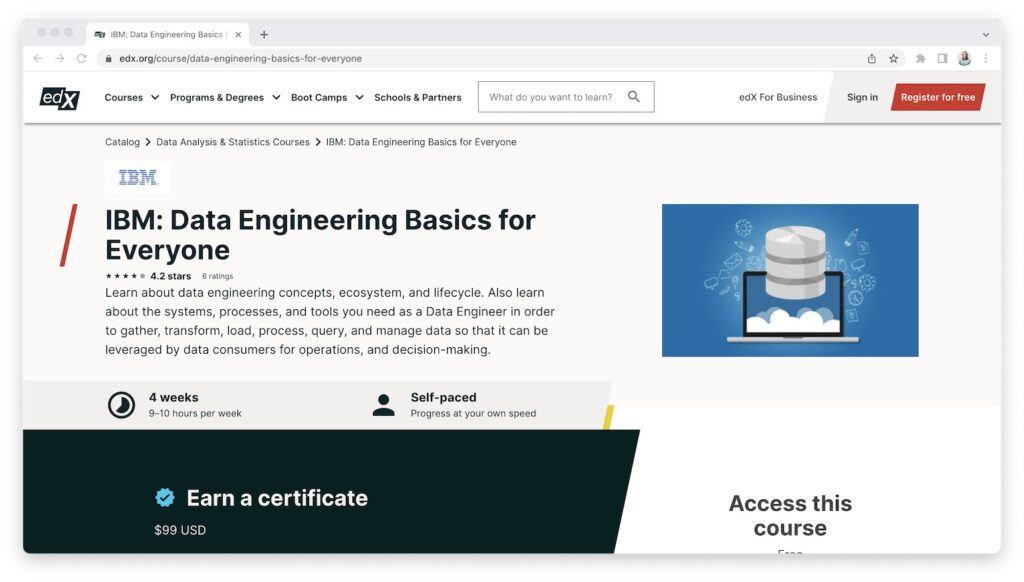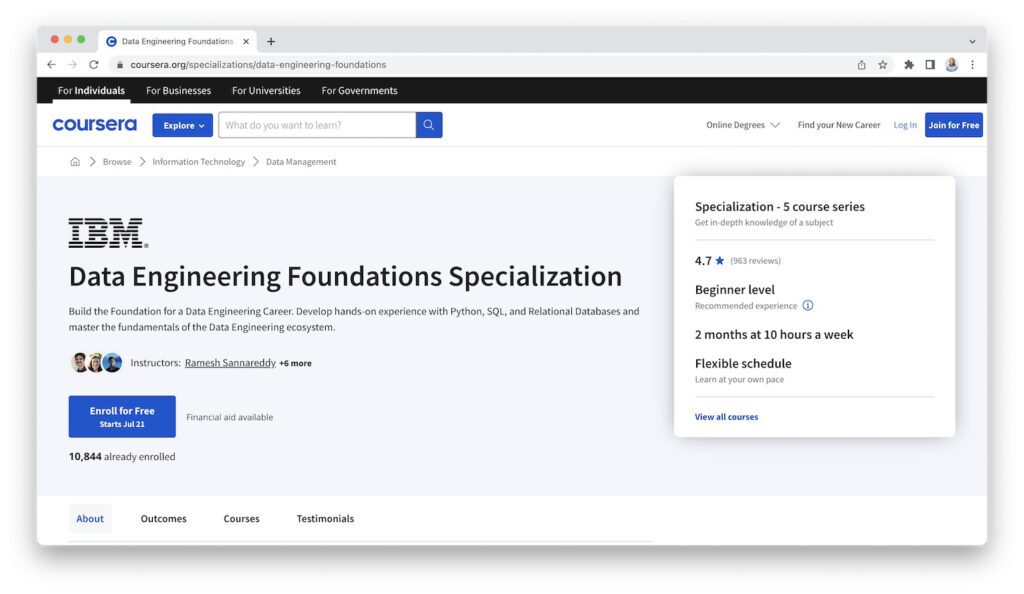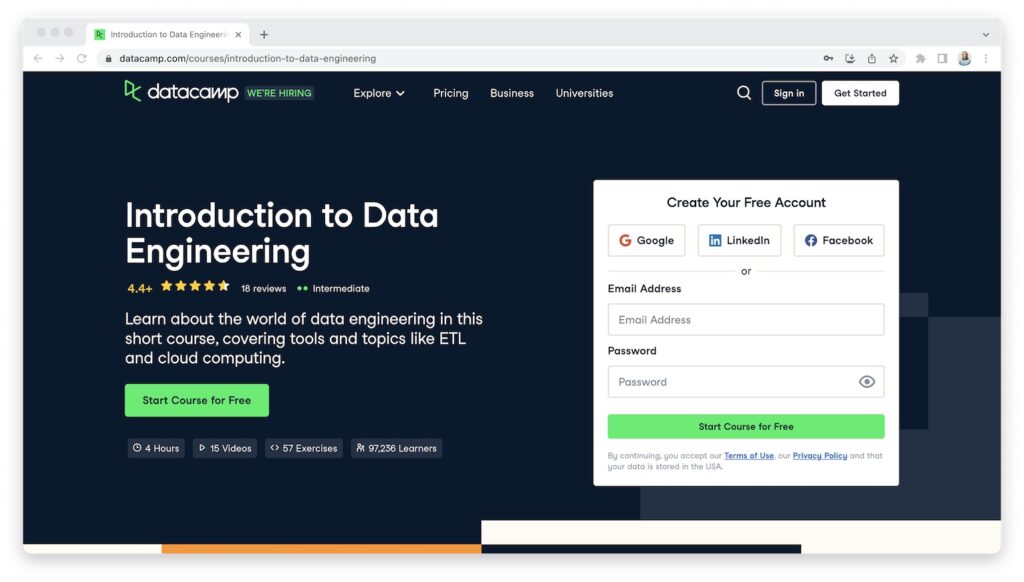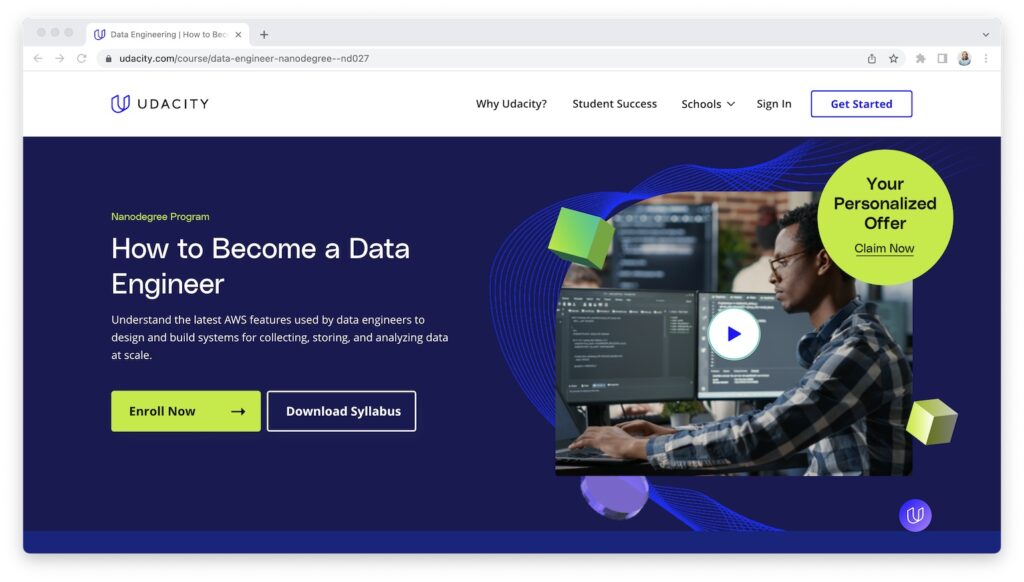What is a data engineer and what does a data engineer do, exactly?
The short version is that data engineers work with other “big data” professionals (data scientists, data analysts, etc.) to enable huge amounts of data to be turned into actionable insights.
Data engineer roles and responsibilities revolve around designing and building systems that help other teams glean valuable insights from data.
Without them, data scientists and data analysts wouldn’t be able to effectively do their jobs.
In this post, I’ll give a quick overview of data engineer jobs — what the job involves, why the data engineer career path could be a good fit depending on your goals, the key data engineer skills you’d need to know to land a job, and some courses to help you learn those skills and tools.
Let’s get started!
What Is a Data Engineer?
A data engineer focuses on the development, testing, maintenance, and optimization of data-oriented systems. They design and build data pipelines, databases, and systems for data analysis and storage.
Usually, data engineer responsibilities also include ongoing maintenance, monitoring, and optimization of the systems they create.

The ultimate goal of a data engineer is to ensure the efficient and secure flow of data to the right place and in the right format.
Data engineer jobs are essential in any organization that wants to gain insights from their data.
🌟 As one data engineer on Reddit puts it: “I’m an IT version of a plumber. I make sure the water flows, it is cleaned and is healthy enough for consumption. I work on storing the water and extracting it. Depending on the requirements, I might build these pipelines for a household, a block of flats, or an office building.”
🌟 In her interview on the LTCWM podcast, Jenn Clevenger (Data Engineering Director at Etsy), said: “A super simple explanation is that a data engineer is an engineer whose primary responsibility is building systems to ingest, store, and prepare very large amounts of data for analytical use, algorithmic use, machine learning, operational finance reporting, etc. There’s a whole slew of things that kind of roll up under data engineering, but the one commonality is large amounts of data.”
Start coding now
Stop waiting and start learning! Get my 10 tips on teaching yourself how to code.
Data engineer vs data scientist
There’s a big skill overlap between data engineers and data scientists, but there are key differences.
⚙️ On a high level, data engineers are focused on the technical aspects of data management, while data scientists are focused on using that data for business insights.
🔀 Data engineers work with tools that funnel, clean and transport data into a centralized database that the data science and analyst teams rely on for their work.
🔍 Data engineers don’t typically need to know how to analyze data, build models, etc., while data scientists do. Data scientists use machine learning, statistics, and other techniques to identify patterns and derive insights from data.
🤔 Data science typically involves more programming/statistics, while data engineering involves more solving database problems and problems with deployed models.
➡️ Take a deeper dive into data science here.
Data engineer vs data analyst
There are lots of differences between the average data analyst vs data engineer job.
🔢 Data analysis is usually a lower-level role that involves gathering data from various sources and preparing it for analysis.
📊 Analysts draw insights, prepare reports, and create visualizations to help companies make better decisions with data.
👷🏻 They aren’t involved with creating or maintaining data architecture like the engineers are.
➡️ Learn more about the data analysis field in this article!
Data engineer vs software engineer
What is a data engineer vs software engineer?
“Software engineering” is a very general term that can refer to a lot of different things.
You could think of data engineering as a subset of software engineering that focuses on data infrastructure and data management.
📱 However, traditional software engineers focus on building software (as the name implies), while data engineering isn’t such a software-forward field.
A data science engineer may or may not consider themselves a type of software engineer.
➡️ Learn about working as a software engineer here.
Data architect vs data engineer
The roles of data architect vs data engineer can feel quite similar on the face of it, since they deal with the same technologies.
✏️ Although there is sometimes more or less overlap, a quick way to think of it is that architects design stuff and engineers build it. A data architect is responsible for the design of data models, architectures, and database structures, but not for their creation or maintenance.
📝 Data architects often work on a consulting/freelance basis, offering an in-depth understanding of the right technologies to use. Once they’ve made a plan, the data engineers might take it from there.

🌟 To sum up some of these data jobs differences, let’s hear from Jenn Clevenger again:
“You can think of data science, analytics, data, UX, all of those things as customers or stakeholders of the foundational data engineering team. Let’s use data science as an example. Data scientists take data and they use it as inputs for modeling or analysis, but that data needs to come from somewhere. Someone needs to be in charge of ingesting that data, you know, storing it somewhere, making it accessible, and operating or creating systems that make it easy to understand and pull the data out. Otherwise, it’s just like looking for a needle in a haystack.”
That someone, of course, is a data analytics engineer.
☝️ Back to top
Data Engineer Roles & Responsibilities
Overall, the main role of a data engineer is to make sure data is accessible by the right people in the right places and ways.
Some examples of data engineer roles/responsibilities include:
- Building and maintaining data pipelines, data warehouses, and other big data systems (as well as participating in the design process alongside architects)
- Ensuring that data is available, secure, compliant, and consistent in quality and format
- Managing and optimizing large-scale data architectures, such as Hadoop clusters, NoSQL databases, and data lakes
- Using custom code to move data from a source to a destination
- Working with common data engineer tools and cloud services like AWS
- Troubleshooting data-architecture-related issues
- Performing code reviews of other engineers’ data models
- Working with data architects and scientists to meet business objectives

Exact data engineer responsibilities on the job will vary based on the company. If you have a certain industry or company in mind that you’d like to work at, check out the data engineer requirements they have in their job listings!
☝️ Back to top
Why Data Engineering Is a Good Career
As organizations generate more and more data, there is a growing need for professionals who can manage and analyze this data effectively.
📈 Data engineering grew 50% YoY in 2020, and according to The 2021 Data Science Interview Report, the amount of data-engineering-specific job interviews increased by 40% in the past year. (Data science interviews grew just 10%, for a comparison.)
👩🏼💻 Over 7,500 data engineer jobs are currently listed on Indeed. That’s more than data scientist jobs, which is at around 5,600.
💰 A data engineer salary can vary widely based on location, experience, and other factors, but these average figures speak for themselves:
- Overall data engineer salary average: $128,631/year
- Entry-level data engineer salary average: $72,359/year
- Senior data engineer salary average: $157,275/year

In addition to a competitive salary, data engineers may also receive bonuses, stock options, and other benefits.
As the demand for data engineers continues to grow, some companies may also offer additional perks, such as flexible work arrangements or opportunities for career growth and development.
☝️ Back to top
Work Life of Data Engineers: Work Environment, Stress, Etc.
Data engineer jobs are often possible to do remotely—although this may depend on the industry. Industries like banking, finance, and healthcare may require you to be on-site in the office since you’re working with sensitive data (although this is not always the case).
Like many other kinds of technical/software roles, data engineer jobs are also usually casual. It’s not a customer-facing job, so most companies won’t require a lot of formality.
Can it be stressful? Sure. Things might break or not work like you want them to. Some days might be longer than others.
🌟 As one Redditor says, “I rarely if ever work over 40 hours in a week. It is more common for me to work 32 than 40+. That said, we sometimes need to do work after hours so as not to impact our product and customers who use it during the day.”
🌟 Another recommends coming up with strategies to streamline your work: “Work/life balance in the DE realm could also depend on how well you do your job. If you set up great processes you mostly just babysit them. Otherwise, you end up having to fix it frequently.”
☝️ Back to top
10 Key Data Engineer Skills & Tools
If you’re wondering how to become a data engineer, the first step is knowing what you need to learn.
Here are ten of the most important data engineer tools, languages, and skills.
- SQL: SQL is the primary language used to query and manipulate data stored in databases, so it’s a critical data engineer skill. You need more than a surface-level understanding here. Learn the differences between Oracle, MySQL, and Hadoop-specific distributed databases, OLTP vs OLAP, etc.
- Data processing techniques: Different data processing techniques can provide different advantages, such as improved accuracy, scalability, and cost efficiency. Data engineer tools for this include Map Reduce, Apache Spark, and traditional SQL or any other ETL framework like the Informatica or Talend framework
- Different architectures for organizing the data e.g. Hadoop, Cassandra, or MongoDB. By knowing different architectures and their features, a data engineer can select the optimal architecture for their project. In some cases, a combination may be the best solution.
- At least one JVM language: Knowledge of a JVM based language such as Java or Scala will be extremely useful, since most open source data processing tools are written using JVM languages. e.g Apache Spark, Apache Flink, etc.
- Scripting (Python): Knowledge of a scripting language such as Bash scripting or Python is very helpful to automate multiple steps required for processing data
- Distributed data storage: Distributed data storage allows data engineers to store large amounts of data in a scalable, secure, and reliable way. With it, data engineers can easily scale their data infrastructure to respond to changes in data usage or demand. You should have knowledge of how distributed data systems such as HDFS or AWS S3 work.
- Cloud platform knowledge: Cloud platforms provide a secure, cost-effective, and easy-to-use solution for storing, managing, and analyzing large volumes of data. You should be familiar with AWS, Azure, and/or GCP.
- Linux: Linux is a powerful and versatile operating system that can be leveraged to manage, store, and process large amounts of data. Most applications are built on Linux systems, so it is crucial to understand how to work with them.
- Building data pipelines: When you connect different data systems together, it’s called a data pipeline. Data engineers should have a deep understanding of the technologies used to build data pipelines such as ETL (Extract, Transform, and Load) processes, data warehouse and data lake architectures, and data storage and visualization tools.
- Business knowledge: Since data engineers work on a lot of requirement-gathering with various stakeholders, it can be super helpful to have business skills. It’s also useful to understand the context in which the data will be used and how it can be leveraged to solve real-world business problems.
You may run into other data engineer requirements based on the exact nature of the job, but knowing these will give you a solid start!
☝️ Back to top
Want to master Python?
Then download my list of favorite Python learning resources.
How to Become a Data Engineer
For those wondering how to become data engineers, the best answer is “gradually.” This isn’t a career transition that’s likely to happen overnight.
Here are some tips for breaking into a data engineering role:
- 🚪 It can sometimes be easier to get your foot in the door by starting out in a related role, like data analytics. This is a good gateway field, and you can work your way up as you continue gaining skills.
- 🎓 You don’t necessarily need a formal degree! You can be self-taught (see online courses below), go to a bootcamp, etc.
- 🏢 Look at your dream company’s data engineer job descriptions; they will usually describe their tech stack. Kubernetes, Kafka, Scala, Java, Python, Airflow, Luigi, etc. Get a sense of what the most frequent tech stack is among companies in your target industry/area.
- 🖥️ Build a portfolio of data engineering projects on a site like GitHub to show to potential employers.
As you gain experience in the data world, you can move your way up the data engineer roadmap—from an entry-level data engineer all the way to senior data engineering (or even becoming a VP or architect).
☝️ Back to top
4 Top Data Engineering Courses
The best way to figure out if you’d enjoy a data engineer role is to start trying it for yourself!
Below, we’re featuring three beginner-friendly data engineering courses, plus an intermediate course focusing specifically on AWS data engineering skills.
Disclosure: I’m a proud affiliate for some of the resources mentioned in this article. If you buy a product through my links on this page, I may get a small commission for referring you. Thanks!
1. Data Engineering Basics for Everyone on edX

In about 4 weeks, you’ll learn about the data engineering ecosystem, lifecycle, and other important concepts. The main objective of this course is to give you a solid understanding of what data engineering is.
It’s a good intro/primer for learning the basics, making it an ideal starting point for absolute beginners.
2. Data Engineering Foundations Specialization on Coursera

Offered by IBM, this Coursera specialization includes 5 courses in total, covering the core concepts, processes, and tools for data engineering—as well as Python programming, industry standard relational databases (including IBM DB2, MySQL, and PostgreSQL) and how to use SQL for data science with Python.
3. Introduction to Data Engineering on DataCamp

A short, 4-hour course covering key data engineering tools and topics like ETL and cloud computing. Includes exercises and interactive tests.
This introductory course is part of a data engineering Track, so you can learn more if you’d like by taking the more advanced courses.
4. How to Become a Data Engineer on Udacity

This intermediate-level Nanodegree will take an estimated 4 months to complete, and covers important AWS data engineer skills.
You’ll learn concepts like data modeling, cloud data warehouses, Spark and data lakes, and how to automate data pipelines.
Note that it’s recommended that you have intermediate Python, intermediate SQL, and command line skills.
☝️ Back to top
Is Data Engineering Right for Me?
Do you enjoy any of the following: data, coding, problem-solving, big-picture thinking, learning how systems work, automation, and working with cutting-edge tech?
If so, a data engineer career path could be a good fit for you.
Another thing to consider is that data engineering is often more in the background, meaning it could be great for introverts. 🫣
(Data scientists, meanwhile, are more likely to have to present things to stakeholders and be on the front lines of explaining their data insights, so that’s a data job that could be better for extroverts.)
Want to further nail down if this is a career you want to jump into?
Check out a few data engineering courses to see if you like it, ask to shadow a data engineer at your current job to see what their daily work life is like, or ask someone you admire on Linkedin for a quick coffee meeting where you talk about what they enjoy (and dislike) about their data engineer role.
Only you can decide if data engineering is right for you, so take some time to explore the role and see if this could be your new career!

